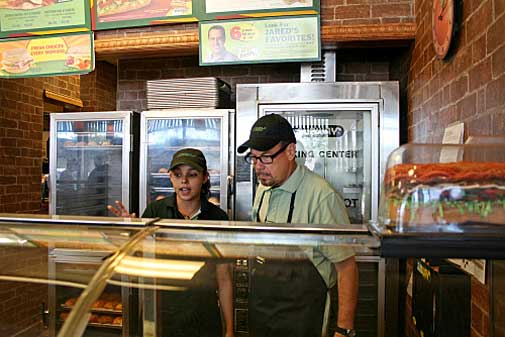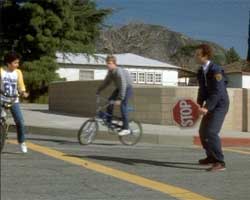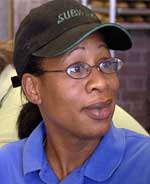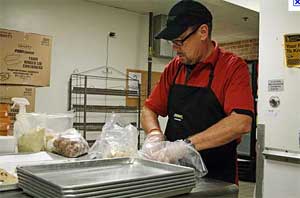
As the U.S. economy limps along and, intones the somber narrator of
Undercover Bosson CBS, "public distrust of wealthy CEOs remains high, more and more bosses are looking for radical ways to reconnect with their workforce."
This reality show's answer each week is to dress up the "boss of a major corporation" as an entry-level worker, and send him or her incognito to see what it's REALLY like out there.
Cross-dressing in corporate America does not cross gender lines, it transgresses class lines. Execs become peons, and, on occasion, lowly worms are catapulted into the executive suite...
Oh, those cameras? Ah... this is a contest. A reality show with two guys competing for the same job. Yeah, that's the ticket.
So it is a reality show that masquerades as a different reality show, yet another British import in the genre. The original, of the same name, premiered on Britain's Channel 4 in 2009. One of its executive producers, Stephen Lambert, is a repeat offender, having successfully shipped Wife Swap and Faking It across the pond from the U.K. to the U.S.
Undercover Boss (Sundays at 9 p.m. ET, pre-empted this weekend by CBS postseason football coverage) is comfort food for a nation starved of secure, well-paid jobs and corporate leaders who put the interests of customers and workers before their own.
Speaking of food, consider a recent episode built around the mega-fast food chain Subway (34,000 outlets in 95 countries). The boss in the episode is Don Fertman, 56, Chief Development Officer -- that is, the honcho most responsible for populating the globe with Subways at rabbit-birth speed.

The chain's founder and CEO, Fred De Luca, is presumably too well known among the rank and file to pull of the hoax. So Fertman, the suit, sheds his suit and -- sporting a fresh goatee, hair and beard dye, and a paper hat (okay, in this chain, baseball caps) with coordinated t-shirt and apron -- becomes a "sandwich artist" (I kid you not) in training named "John Wilson."
Why the dye job? Because a store manager might recognize the corporate CDO? Not a chance. I'm thinking it's because a fifty-six-year-old guy "looking for a new career" on the fast food line is even more dispiriting than a forty-something-looking guy.

Remember the Albert Brooks character in the ennui film classic Lost in America, interviewing for a crossing guard position after being tossed from his high-paid ad agency job? That was 1985, when currents of downsizing and outsourcing already were running strong. Same pit of the stomach jab for me -- a middle-aged white guy -- when Fertman a.k.a. Wilson straps on his first apron.
But Undercover Boss is no downward mobility nightmare. Rather, it is a tale of redemption at every level -- surface level, anyway -- from board room to sandwich prep table. In this episode, boosterishly dangerously close to infomercial territory, fast food employment is not the occupational dead end of a hollowed-out, post-industrial economy, Instead, it is the site of rich community ties, economic independence, and salvation through upward mobility. And these top bosses are loveably flawed, approachable, attentive, and benevolent.
Take CDO Fertman. No high school dork to MBA to corporate bean counting for this guy. In fading Polaroids we see his rock band, The Crayons, and learn of his young adulthood decline into alcohol and drug addiction, then his resurrection, aided by a fateful opportunity -- his first Subway job.
Over the course of a week, "John Wilson" will relive a painful first-day-on-the-job at four different Subways across the country. (Alas, the bejeweled opportunities missed by not sending him to Dubai!) Each of his four new bosses, the store managers, will push him far beyond his abilities, which turn out to be astonishingly limited, unless he's just playing slow to garner sympathy.
His first boss is a sixteen-year-old-looking nineteen-year-old who lives with her dad (mom walked out Day One) and is paying her own way through college. Working at Subway. Right. She takes no guff from her sluggish new middle-aged charge. "Oh, funny guy," she shoots back at "Wilson" when he tries to joke around on the job.

Also featured is an African-American woman manager who took a temporary job at Subway, and stayed nineteen years -- and seems to know and care about her customer's lives better than the neighborhood rabbi. ("Wilson," in pathetic contrast, cannot converse and build a Turkey Breast Classic at the same time.)
When the manager in the third store, a young man who might be from the Middle East, tells the camera, "John is just not up to par. He is just not cuttin' it," we want to cheer. By now we love them all -- for how they bake our daily bread, efficiently and politely, for how they do it our way. Except for the new guy.
No one, though, outshines the fourth store manager. A foster child, he has risen quickly to managementhood in his Subway, which is attached to... the local African American church! And now he is raising four foster children of his own.
The minister of this church/Subway duplex implausibly gives the new sandwich maker a personal tour of his pulpit. In America, fast food lives in harmony with all races, creeds, and religions. At the end of the week, "Wilson" turns himself back into Fertman. He betrays none of the grinding exhaustion reported by author Barbara Ehernreich, who, for her wrenching 2001 book Nickel and Dimed, similarly toiled in the cellar of America's low-wage service economy. In her minimum-wage jobs, Ehernreich found it impossible to rent decent housing and keep a clunker running, much less attend college or support a family.
When Fertman reports to De Luca and other unidentified uberbosses, they listen, they appreciate, they take away lessons. We are led to believe that this week-long experiment -- like, say, the million-dollar strategic planning reports the firm has commissioned over the years from pin-striped consulting firms -- will redirect its corporate mission.

Then come the store managers, to meet the real "John Wilson." The once feisty and hard-driving manager of the first store now genuflects before the corporate-headquarters version of Fertman. You want her to make him put the damn apron back on and to whip him into shape.
Instead, be bestows corporate largess, giving each a game-show-prize moment of ecstasy. You will play an expanded role in corporate development, he tells them one by one -- by making a training film, or funneling line-worker ideas up the corporate chain, and the like. And we appreciative executives at Subway are giving you thousands of dollars -- for a charity, for college, for the church -- and thousands more to spend on yourself.
But most important of all, the workers are told, you have been noticed, and appreciated. This show is only secondarily about benevolent management. Foremost, it is an inspirational trope for the hundreds of millions who put in a decent day's work in crappy jobs.
"I am just so ecstatic that somebody actually recognized that I do a good job," reflected one of the managers. How wonderful. How sad. She is smiling and seems grateful, but her "actually" speaks volumes.
Undercover Boss doesn't exactly offer a vision of a classless society. In the end, Fertman is the boss, and Fertman is paternalistic. But he is a likable and, in one version of Christianity, a fallible and benevolent Father. His disciples, the young managers, are saints. Surely, off camera, they were heavily prescreened. The corporation hardly is prepared to promote and shower gifts upon every store manager who works hard and does a good job.

For all the editing for uplift, the camera still catches teenage managers checking their watches and barking orders about how many seconds it should take to make a hoagie. Frederick W. Taylor, who invented "scientific management" and "time and motion" studies to speed up industrial work at the turn of the twentieth century, would have been pleased.
And we can be sure that Fertman wouldn't have made the grade -- then or now. As one of the young managers put it succinctly, this new guy Wilson "sucks."
Fertman is probably good at his regular day job. Why did I come away thinking he should be a first-rate "sandwich artist," too? And store manager, for that matter. Both Fertman and his cross-dressed alter ego are likable fellows, to be sure. But his lackluster work outside the executive suite did little to diminish my personal slice of "public distrust of wealthy" executives.
With top U.S. executives now paid many hundreds of times more than the lowest-paid employees in their firms, can't they at least put in a respectable showing at the entry level? Do they truly add a thousand times more value than the noble grunts on the front line?